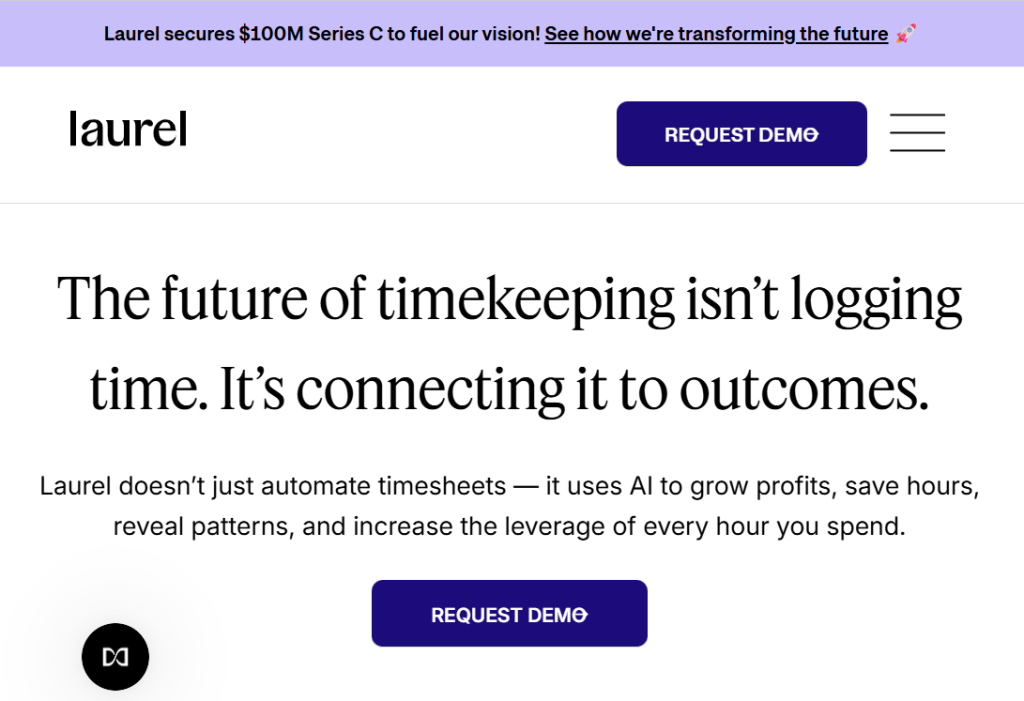Laurel Secures $100M Series C to Redefine Legal Productivity at Scale
July 5, 2025
byFenoms Start-Ups

Laurel, a fast-growing legal tech company building AI-powered infrastructure for law firms and corporate legal teams, has announced a $100 million Series C raise. The round was led by top-tier investors IVP and GV (Google Ventures), marking a major milestone in Laurel’s mission to eliminate administrative inefficiencies in legal work.
Founded by Ryan Alshak, a former litigator turned tech entrepreneur, Laurel is on a mission to transform how legal professionals track time, manage billing, and engage with operational tasks. The company’s vision? To help lawyers get back to lawyering - by removing the friction caused by outdated workflows and manual entry systems.
Laurel’s Platform: Where Legal Meets Intelligent Automation
At the heart of Laurel’s product is an AI-powered system that automates time tracking, billing capture, and matter management - functions that consume massive time but deliver no legal value. Instead of relying on lawyers to reconstruct billable hours, Laurel automatically captures interactions across calendars, email, documents, and calls - building a real-time, passive record of activity.
This isn’t a time tracker. It’s legal infrastructure, and it’s designed to scale.
The problem Laurel is solving is deeply rooted: law firms lose billions annually to untracked or disputed hours, while lawyers face burnout due to excessive administrative work. By embedding AI into the legal workflow, Laurel offloads that operational overhead and replaces it with transparency, efficiency, and trust.
This Is What the Best Legal Tech Founders Already Know
In the middle of the legal tech surge, a quiet truth is emerging: the most successful platforms aren’t built to measure time - they’re built to measure trust. Laurel’s real innovation isn’t just in automation. It’s in how that automation strengthens the relationship between client and counsel.
Traditional timekeeping leads to billing disputes, write-downs, and weakened firm-client dynamics. But Laurel’s real-time records offer transparency by design - reducing friction, removing guesswork, and creating accountability without adding overhead.
Now here’s where most founders miss a crucial window: if you’re building infrastructure for a legacy industry, you must think in second-order outcomes. It’s not just about what the tool does - it’s about what trust enables. In Laurel’s case, trust translates into reduced revenue leakage, faster collections, fewer disputes, and client loyalty that becomes a moat.
Here’s the insight: every infrastructure product should drive a downstream benefit that compounds over time. Laurel doesn’t just automate admin work - it boosts margin, accelerates revenue cycles, and improves retention. The founders who win long-term are the ones who frame their product around that second-order economic layer. That’s what investors underwrite. That’s what moves valuation multiples from 5x to 15x ARR.
Legal Tech’s Exploding Market Opportunity
Laurel is building into one of the most rapidly evolving categories in enterprise software. Legal teams, once considered laggards in tech adoption, are now embracing automation and AI in record numbers. According to Grand View Research, the legal tech market was worth $29 billion in 2023 and is forecasted to exceed $100 billion by 2032, growing at a 13.9% CAGR.
Global legal spend is also exploding - Statista projects it will hit $1.3 trillion by 2027 - but efficiency is no longer optional. Law firms are under mounting pressure to do more with less, while corporate legal departments demand greater transparency and predictability.
And the shift is already in motion. Gartner reports that 50% of legal work in major transactions will be automated by 2026. The future of legal work won’t just include platforms like Laurel - it will depend on them.
Backing from Industry Giants: IVP and GV Lead the Charge
This $100M Series C round, led by IVP and GV, signals confidence not only in Laurel’s product but in its business fundamentals. IVP brings deep experience in scale-stage SaaS and enterprise software, while GV adds AI depth and strategic muscle. Together, the two firms represent a rare pairing of operational know-how and future-of-work vision.
Their involvement points to a larger pattern: investors are no longer hesitant about vertical SaaS in legal. With tools like Laurel, the category has matured, and is now considered one of the most promising niches for intelligent enterprise platforms.
What’s Next for Laurel
With this new round of funding, Laurel plans to:
- Expand internationally into key markets across Europe and Asia
- Build out its machine learning and compliance analytics engine
- Launch features for predictive staffing, audit-ready billing, and multi-jurisdictional compliance
- Grow its team across engineering, product, legal operations, and sales
The company’s momentum is strong - and its roadmap shows no signs of slowing. Laurel isn’t just solving for today’s legal friction. It’s building a system flexible enough to evolve with the future of work in law.









